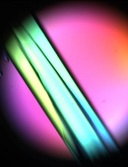
Protein crystallization can be an efficient alternative to the purification of proteins on an industrial scale. Rational mutagenesis of amino acid residues at crystal contacts can enable and improve protein crystallization processes. Furthermore, molecular dynamics (MD) simulations can be used to quantitatively determine the relative molecular contact stabilities of protein mutants.
Relevant for technical applications of protein crystallization is, besides the achievable yield in thermodynamic equilibrium, especially the rate of nucleation and crystallization in the scalable stirred crystallizer. In this research project, the correlation between the relative molecular contact stability and the crystallization kinetics (nucleation and crystal growth) will be studied using the example of enzyme mutants of different proteins such as the alcohol dehydrogenase from Lactobacillus brevis (LbADH).
In addition to measuring the nucleation and crystallization kinetics via dynamic light scattering (DLS), the dynamics of protein crystal formation in the hydrodynamically defined stirred crystallizer will be recorded by online in-situ microscopy with coupled automated image analysis. This will allow the first quantitative investigation of how the relative molecular contact stability of protein mutants affects both nucleation and crystal growth kinetics during saturation crystallization in the stirred crystallizer under comparable conditions. The overall objective is to extend the usual empirical approach to protein crystallization by a model-based approach, which will make it easier to realize industrial applications of protein crystallization in the future.